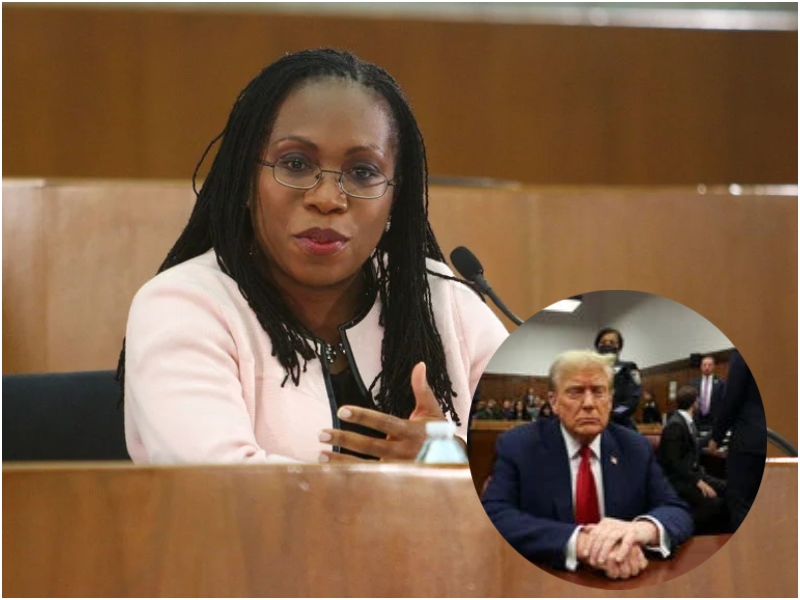As the United States Supreme Court faces a wave of consequential litigation under the administration of President Donald J. Trump, Justice Ketanji Brown Jackson is distinguishing herself as the Court’s most forceful and independent liberal voice—issuing a series of sharply worded dissents that directly challenge both executive actions and the conservative majority’s procedural posture.
In recent rulings, Jackson has openly criticized what she characterizes as both the administration’s overreach and the Court’s increasing reliance on the emergency docket, often referred to as the “shadow docket.”
Her opinions reflect not only substantive legal objections but also concern for the institutional credibility of the Court.
Jackson Denounces Deportation Ruling, Cites Korematsu
This week, the Court permitted the Trump administration to invoke the Alien Enemies Act of 1798 to deport Venezuelan nationals to El Salvador. While Justice Sonia Sotomayor authored the primary dissent, Jackson took the rare step of writing separately—drawing a direct line to Korematsu v. United States, the 1944 ruling that infamously upheld Japanese American internment.
“At least when the Court went off base in the past, it left a record so posterity could see how it went wrong,” Jackson wrote. “We are just as wrong now as we have been in the past, with similarly devastating consequences. It just seems we are now less willing to face it.”
Neither Sotomayor, nor fellow liberal Justices Elena Kagan or Amy Coney Barrett joined Jackson’s separate opinion—underscoring her willingness to stake out a solo legal position when necessary.
Critical of Trump-Era Policies and Procedural Shortcuts
In another matter, Jackson strongly rebuked the Department of Education’s cancellation of teacher training grants, some of which supported diversity initiatives.
She decried what she called a “robotic rollout” and “highly questionable behavior,” and took aim at the Court’s expedited review:
“It appears that the primary effect of today’s action is to hand the Government an early ‘win’—a notch in its belt at the start of a legal battle in which the long-term prospects for its eventual success seem doubtful.”
Again, Sotomayor joined her dissent, but Kagan did not. Chief Justice John Roberts, who also dissented from the majority’s decision, did so in a single line and joined no written opinions.
In contrast, Kagan issued her own brief dissent in the same case, describing the majority’s logic as “under-developed,” while also acknowledging “good-faith disagreements” about the Court’s use of emergency procedures.
Jackson, however, took a firmer stance, stating:
“I worry that permitting the emergency docket to be hijacked in this way… damages our institutional credibility.”
Pattern of Independent Dissent
Since her confirmation in 2022 as the first Black woman to serve on the Supreme Court, Justice Jackson has demonstrated a consistent pattern of writing separate opinions—even when aligned with the liberal bloc. Her writing is distinguished by its analytical depth and rhetorical force, often aimed at public transparency rather than internal persuasion.
In the Supreme Court’s recent ruling on presidential immunity, Jackson joined Sotomayor and Kagan’s joint dissent but also authored a 22-page opinion of her own to outline what she characterized as a “paradigm shift” in executive accountability:
“I write separately to explain… the theoretical nuts and bolts of what, exactly, the majority has done today to alter the paradigm of accountability for Presidents of the United States.”
This practice stands in contrast to previous norms. During her tenure as the senior liberal justice, the late Ruth Bader Ginsburg typically encouraged the left-leaning justices to speak as a unified minority voice. Jackson’s approach, however, reflects an intentional deviation that emphasizes documentation of disagreement over institutional consensus.
Legal Implications Amid High-Stakes Trump Litigation
The legal landscape under President Trump’s renewed administration presents extraordinary constitutional questions, from executive authority to civil liberties and agency discretion.
Justice Jackson’s recent writings suggest a proactive effort to define a jurisprudential identity grounded in transparency, civil rights protections, and democratic accountability.
Her work may not shift immediate outcomes, but it positions her as a key legal voice in the historical and doctrinal analysis of Trump-era rulings.

